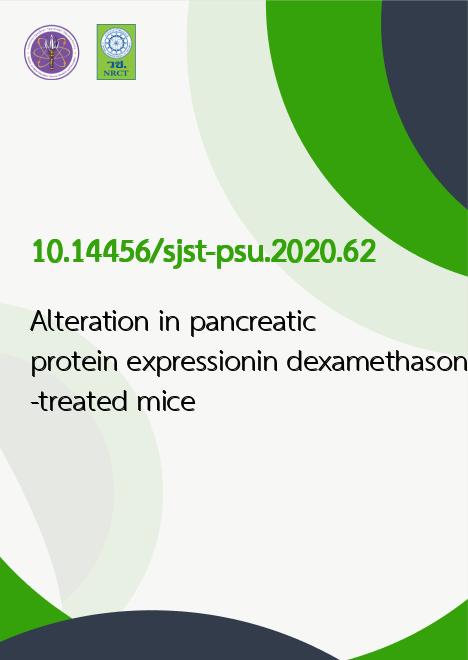
|
Alteration in pancreatic protein expressionin dexamethasone-treated mice |
|---|---|
| รหัสดีโอไอ | |
| Creator | 1. Amod Sharma 2. Sittiruk Roytrakul 3. Suthathip Kittisenachai 4. Namoiy Semprasert 5. Suwattanee Kooptiwut |
| Title | Alteration in pancreatic protein expressionin dexamethasone-treated mice |
| Publisher | Research and Development Office, Prince of Songkla University |
| Publication Year | 2563 |
| Journal Title | Songklanakarin Journal of Science and Technology |
| Journal Vol. | 42 |
| Journal No. | 3 |
| Page no. | 477-486 |
| Keyword | mice, dexamethasone, pancreatic proteome, 2D electrophoresis, LC-MS/MS |
| URL Website | https://rdo.psu.ac.th/sjstweb/index.php |
| ISSN | 0125-3395 |
| Abstract | The aim of this study was to gain insight into pancreatic proteome changes induced by dexamethasone treatment. Sixweek-old male ICR mice were subcutaneously injected with or without dexamethasone (10 mg/kg body weight; n= 5-6 mice pergroup) for 4 weeks. Body weight, food intake, and fasting blood glucose were measured at baseline and at the end of 4 weeks.The mice were sacrificed and pancreases were removed, frozen, and stored at -75?C until analysis. Proteins were extracted, twodimensional gel electrophoresis was performed and proteome profiles were examined with colloidal coomassie brilliant bluestaining. Statistically significant protein spots (ANOVA, p<0.05) with 1.2-fold difference were excised and analyzed by LCMS/MS. Proteomic data were evaluated using Western blot analysis. High-dose dexamethasone induced hyperglycemia, reducedbody weight, reduced food intake, and altered pancreatic proteins in mice. The affected proteins mainly belonged to cell redoxhomeostasis, metabolism, endoplasmic reticulum stress, translation, and signaling pathways. |
